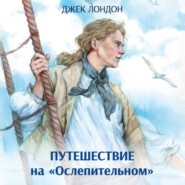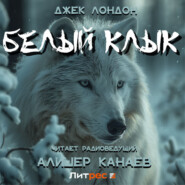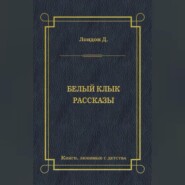По всем вопросам обращайтесь на: info@litportal.ru
(©) 2003-2024.
✖
Smoke Bellew
Настройки чтения
Размер шрифта
Высота строк
Поля
“You might tell me what’s happened,” Smoke urged.
The flash of white teeth through the stained beard was not pleasant. “Certainly, I’ll tell you. Your partner has killed one of my people. That sniveling shrimp, McCan, deserted at the first shot. He’ll never run away again. But my hunters have got your partner in the mountains, and they’ll get him. He’ll never make the Yukon basin. As for you, from now on you sleep at my fire. And there’ll be no more scouting with the young men. I shall have my eye on you.”
Smoke’s new situation at Snass’s fire was embarrassing. He saw more of Labiskwee than ever. In its sweetness and innocence, the frankness of her love was terrible. Her glances were love glances; every look was a caress. A score of times he nerved himself to tell her of Joy Gastell, and a score of times he discovered that he was a coward. The damnable part of it was that Labiskwee was so delightful. She was good to look upon. Despite the hurt to his self-esteem of every moment spent with her, he pleasured in every such moment. For the first time in his life he was really learning woman, and so clear was Labiskwee’s soul, so appalling in its innocence and ignorance, that he could not misread a line of it. All the pristine goodness of her sex was in her, uncultured by the conventionality of knowledge or the deceit of self-protection. In memory he reread his Schopenhauer and knew beyond all cavil that the sad philosopher was wrong. To know woman, as Smoke came to know Labiskwee, was to know that all woman-haters were sick men.
Labiskwee was wonderful, and yet, beside her face in the flesh burned the vision of the face of Joy Gastell. Joy had control, restraint, all the feminine inhibitions of civilization, yet, by the trick of his fancy and the living preachment of the woman before him, Joy Gastell was stripped to a goodness at par with Labiskwee’s. The one but appreciated the other, and all women of all the world appreciated by what Smoke saw in the soul of Labiskwee at Snass’s fire in the snow-land.
And Smoke learned about himself. He remembered back to all he knew of Joy Gastell, and he knew that he loved her. Yet he delighted in Labiskwee. And what was this feeling of delight but love? He could demean it by no less a name. Love it was. Love it must be. And he was shocked to the roots of his soul by the discovery of this polygamous strain in his nature. He had heard it argued, in the San Francisco studios, that it was possible for a man to love two women, or even three women, at a time. But he had not believed it. How could he believe it when he had not had the experience? Now it was different. He did truly love two women, and though most of the time he was quite convinced that he loved Joy Gastell more, there were other moments when he felt with equal certainty that he loved Labiskwee more.
“There must be many women in the world,” she said one day. “And women like men. Many women must have liked you. Tell me.”
He did not reply.
“Tell me,” she insisted.
“I have never married,” he evaded.
“And there is no one else? No other Iseult out there beyond the mountains?”
Then it was that Smoke knew himself a coward. He lied. Reluctantly he did it, but he lied. He shook his head with a slow indulgent smile, and in his face was more of fondness than he dreamed as he noted Labiskwee’s swift joy-transfiguration.
He excused himself to himself. His reasoning was jesuitical beyond dispute, and yet he was not Spartan enough to strike this child-woman a quivering heart-stroke.
Snass, too, was a perturbing factor in the problem. Little escaped his black eyes, and he spoke significantly.
“No man cares to see his daughter married,” he said to Smoke. “At least, no man of imagination. It hurts. The thought of it hurts, I tell you. Just the same, in the natural order of life, Margaret must marry some time.”
A pause fell; Smoke caught himself wondering for the thousandth time what Snass’s history must be.
“I am a harsh, cruel man,” Snass went on. “Yet the law is the law, and I am just. Nay, here with this primitive people, I am the law and the justice. Beyond my will no man goes. Also, I am a father, and all my days I have been cursed with imagination.”
Whither his monologue tended, Smoke did not learn, for it was interrupted by a burst of chiding and silvery laughter from Labiskwee’s tent, where she played with a new-caught wolf-cub. A spasm of pain twitched Snass’s face.
“I can stand it,” he muttered grimly. “Margaret must be married, and it is my fortune, and hers, that you are here. I had little hopes of Four Eyes. McCan was so hopeless I turned him over to a squaw who had lighted her fire twenty seasons. If it hadn’t been you, it would have been an Indian. Libash might have become the father of my grandchildren.”
And then Labiskwee came from her tent to the fire, the wolf-cub in her arms, drawn as by a magnet, to gaze upon the man, in her eyes the love that art had never taught to hide.
* * * * * *
“Listen to me,” said McCan. “The spring thaw is here, an’ the crust is comin’ on the snow. It’s the time to travel, exceptin’ for the spring blizzards in the mountains. I know them. I would run with no less a man than you.”
“But you can’t run,” Smoke contradicted. “You can keep up with no man. Your backbone is limber as thawed marrow. If I run, I run alone. The world fades, and perhaps I shall never run. Caribou meat is very good, and soon will come summer and the salmon.”
Said Snass: “Your partner is dead. My hunters did not kill him. They found the body, frozen in the first of the spring storms in the mountains. No man can escape. When shall we celebrate your marriage?”
And Labiskwee: “I watch you. There is trouble in your eyes, in your face. Oh, I do know all your face. There is a little scar on your neck, just under the ear. When you are happy, the corners of your mouth turn up. When you think sad thoughts they turn down. When you smile there are three and four wrinkles at the corners of your eyes. When you laugh there are six. Sometimes I have almost counted seven. But I cannot count them now. I have never read books. I do not know how to read. But Four Eyes taught me much. My grammar is good. He taught me. And in his own eyes I have seen the trouble of the hunger for the world. He was often hungry for the world. Yet here was good meat, and fish in plenty, and the berries and the roots, and often flour came back for the furs through the Porcupines and the Luskwas. Yet was he hungry for the world. Is the world so good that you, too, are hungry for it? Four Eyes had nothing. But you have me.” She sighed and shook her head. “Four Eyes died still hungry for the world. And if you lived here always would you, too, die hungry for the world? I am afraid I do not know the world. Do you want to run away to the world?”
Smoke could not speak, but by his mouth-corner lines was she convinced.
Minutes of silence passed, in which she visibly struggled, while Smoke cursed himself for the unguessed weakness that enabled him to speak the truth about his hunger for the world while it kept his lips tight on the truth of the existence of the other woman.
Again Labiskwee sighed.
“Very well. I love you more than I fear my father’s anger, and he is more terrible in anger than a mountain storm. You told me what love is. This is the test of love. I shall help you to run away back to the world.”
Smoke awakened softly and without movement. Warm small fingers touched his cheek and slid gently to a pressure on his lips. Fur, with the chill of frost clinging in it, next tingled his skin, and the one word, “Come,” was breathed in his ear. He sat up carefully and listened. The hundreds of wolf-dogs in the camp had lifted their nocturnal song, but under the volume of it, close at hand, he could distinguish the light, regular breathing of Snass.
Labiskwee tugged gently at Smoke’s sleeve, and he knew she wished him to follow. He took his moccasins and German socks in his hand and crept out into the snow in his sleeping moccasins. Beyond the glow from the dying embers of the fire, she indicated to him to put on his outer foot-gear, and while he obeyed, she went back under the fly where Snass slept.
Feeling the hands of his watch Smoke found it was one in the morning. Quite warm it was, he decided, not more than ten below zero. Labiskwee rejoined him and led him on through the dark runways of the sleeping camp. Walk lightly as they could, the frost crunched crisply under their moccasins, but the sound was drowned by the clamor of the dogs, too deep in their howling to snarl at the man and woman who passed.
“Now we can talk,” she said, when the last fire had been left half a mile behind.
And now, in the starlight, facing him, Smoke noted for the first time that her arms were burdened, and, on feeling, discovered she carried his snowshoes, a rifle, two belts of ammunition, and his sleeping-robes.
“I have everything fixed,” she said, with a happy little laugh. “I have been two days making the cache. There is meat, even flour, matches, and skees, which go best on the hard crust and, when they break through, the webs will hold up longer. Oh, I do know snow-travel, and we shall go fast, my lover.”
Smoke checked his speech. That she had been arranging his escape was surprise enough, but that she had planned to go with him was more than he was prepared for. Unable to think immediate action, he gently, one by one, took her burdens from her. He put his arm around her and pressed her close, and still he could not think what to do.
“God is good,” she whispered. “He sent me a lover.”
Yet Smoke was brave enough not to suggest his going alone. And before he spoke again he saw all his memory of the bright world and the sun-lands reel and fade.
“We will go back, Labiskwee,” he said. “You will be my wife, and we shall live always with the Caribou People.”
“No! no!” She shook her head; and her body, in the circle of his arm, resented his proposal. “I know. I have thought much. The hunger for the world would come upon you, and in the long nights it would devour your heart. Four Eyes died of hunger for the world. So would you die. All men from the world hunger for it. And I will not have you die. We will go on across the snow mountains on the south traverse.”
“Dear, listen,” he urged. “We must go back.”
She pressed her mitten against his lips to prevent further speech. “You love me. Say that you love me.”
“I do love you, Labiskwee. You are my wonderful sweetheart.”
Again the mitten was a caressing obstacle to utterance.
“We shall go on to the cache,” she said with decision. “It is three miles from here. Come.”
He held back, and her pull on his arm could not move him. Almost was he tempted to tell her of the other woman beyond the south traverse.
“It would be a great wrong to you to go back,” she said. “I – I am only a wild girl, and I am afraid of the world; but I am more afraid for you. You see, it is as you told me. I love you more than anybody else in the world. I love you more than myself. The Indian language is not a good language. The English language is not a good language. The thoughts in my heart for you, as bright and as many as the stars – there is no language for them. How can I tell you them? They are there – see?”
As she spoke she slipped the mitten from his hand and thrust the hand inside the warmth of her parka until it rested against her heart. Tightly and steadily she pressed his hand in its position. And in the long silence he felt the beat, beat of her heart, and knew that every beat of it was love. And then, slowly, almost imperceptibly, still holding his hand, her body began to incline away from his and toward the direction of the cache. Nor could he resist. It was as if he were drawn by her heart itself that so nearly lay in the hollow of his hand.
So firm was the crust, frozen during the night after the previous day’s surface-thaw, that they slid along rapidly on their skees.
“Just here, in the trees, is the cache,” Labiskwee told Smoke.
The next moment she caught his arm with a startle of surprise. The flames of a small fire were dancing merrily, and crouched by the fire was McCan. Labiskwee muttered something in Indian, and so lashlike was the sound that Smoke remembered she had been called “cheetah” by Four Eyes.

















